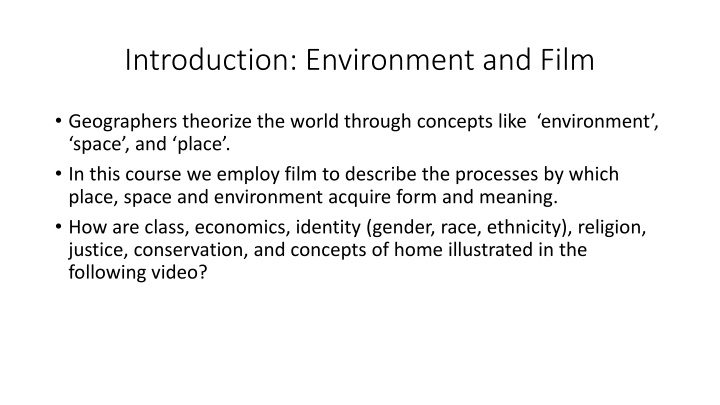
Exploring Place, Space, and Environment Through Film Geographies
Dive into the world of geography through the lens of film, uncovering how concepts like place, space, and environment shape our understanding of class, economics, identity, religion, justice, and more. Discover the nuances of atmosphere, environmental determinism, epistemology, and habitus as they influence our interactions with the world around us.
Download Presentation

Please find below an Image/Link to download the presentation.
The content on the website is provided AS IS for your information and personal use only. It may not be sold, licensed, or shared on other websites without obtaining consent from the author. If you encounter any issues during the download, it is possible that the publisher has removed the file from their server.
You are allowed to download the files provided on this website for personal or commercial use, subject to the condition that they are used lawfully. All files are the property of their respective owners.
The content on the website is provided AS IS for your information and personal use only. It may not be sold, licensed, or shared on other websites without obtaining consent from the author.
E N D
Presentation Transcript
Introduction: Environment and Film Geographers theorize the world through concepts like environment , space , and place . In this course we employ film to describe the processes by which place, space and environment acquire form and meaning. How are class, economics, identity (gender, race, ethnicity), religion, justice, conservation, and concepts of home illustrated in the following video?
Terms atmosphere ecological fallacy environmental determinism environmental possibilism epistemology habitus idiographic individualistic fallacy MAUP nomothetic phenomenology place space umwelt
Atmosphere An atmosphere can refer to anything ranging from a room to a political climate, from a person s presence to the feel of a city. To speak of the atmosphere of a room (or city or landscape) is to speak of a dialogue that takes place between the inhabitants and the space itself
Ecological fallacy/individualistic fallacy Individualistic fallacy: extrapolating to broad extents based on observations made at small, local extents Ecological fallacy: making local-scale characterizations based on observations at broad extents.
Environmental determinism The idea that the environment shapes individuals, groups, societies and states towards particular development trajectories
Environmental possibilism The ideas that the environment exerts an influence on us, but the outcomes are more open-ended due to human agency and the availability of choices
Epistemology An epistemology is a way of thinking which sets the boundaries of what can and can t be known or what is possible and what is not within a particular place
Habitus The mental structures of thought that individuals develop over the course of the varying circumstances of their lifetime These mental structures guide the way individuals observe, appreciate, and act.
Idiographic Unique, not the result of general trends or laws. The opposite of nomothetic.
MAUP Modifiable areal unit problem How boundaries are drawn determines meaning and interpretation Based originally on the idea of gerrymandering, but applies to any aspects of space and time
Nomothetic The result of laws that apply everywhere they are universal. Explanation is based on general laws and relationships that always hold true
Place A portion of geographical space, sometimes called territories of meaning The difference between space and place can be described as the extent to which human beings have given meaning to a specific area.
Phenomenology Phenomenology is the study of the ways we experience things and the meanings things have in our experience. Phenomenology studies conscious experience from the subjective or first-person point of view
Space Space can be described as a location which has no social connections for a human being. It can also be thought of as a container that holds entities, which is a Cartesian form of space.
Structuration theory Human agency and social structure reinforce one another We make the world by our choices and actions Individuals are simultaneously produced by, and producers of, their geography as well as history.
Umwelt Self-world A bubble around each organism that represents its own world and how it experiences it
